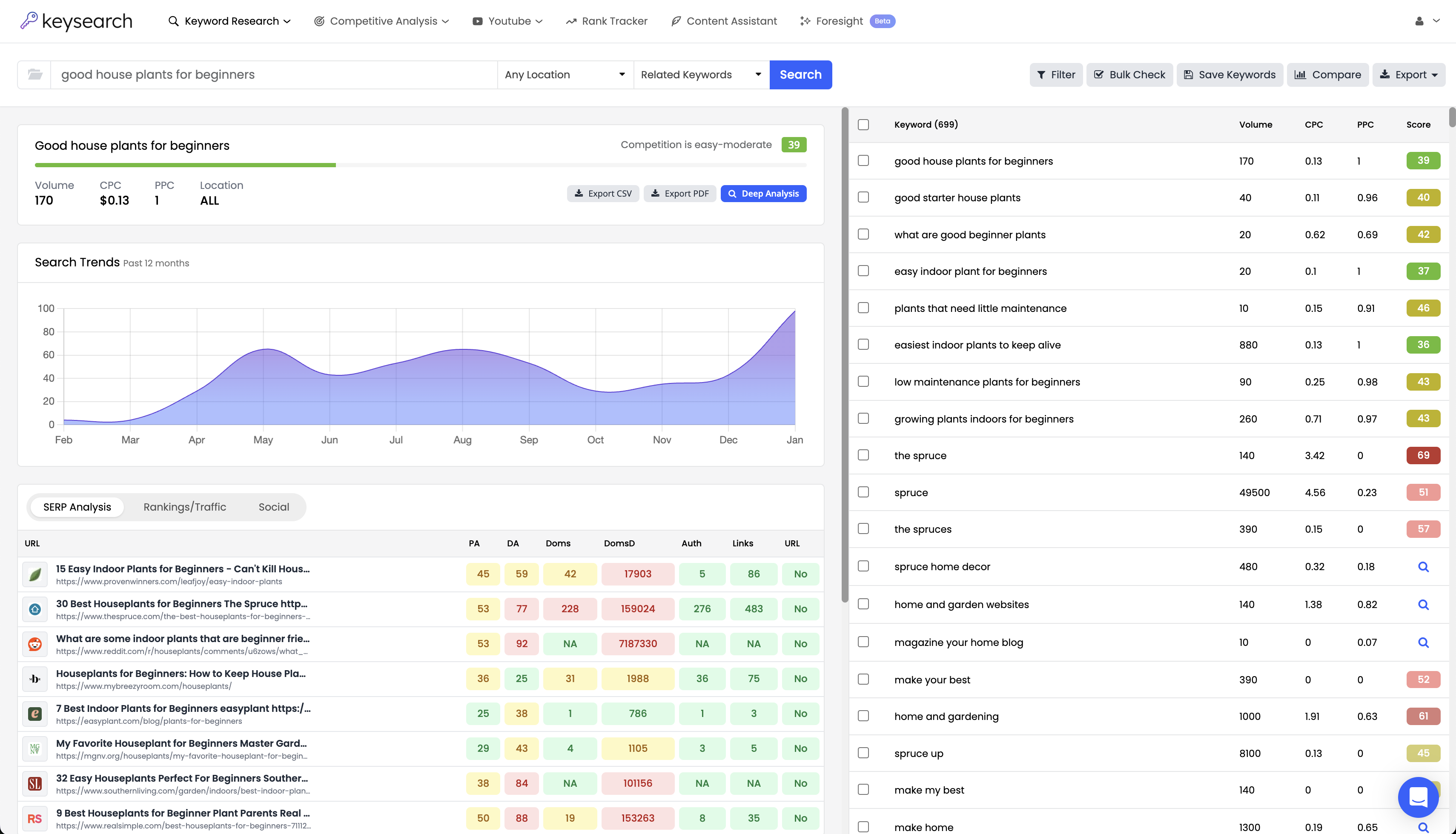Within Keysearch you may have noticed that we not only provide a keyword competition score but we also have different color levels corresponding with keyword difficulty. A question we get asked fairly often is “What exactly do the competition levels mean?”.
It’s very easy to look at the keyword competition score, or take a quick glance at the color we show for the competition and say “Hey that keyword is hard to rank” or “Hey that keyword is easy to rank”. That’s all fine and good but in this article, we want to answer that age ol’ question “What does it all mean?!”.
SEO Competition Levels

Within Keysearch we have 6 different competition levels.
- Competition is very easy (Light Blue)
- Competition is fairly easy (Light Green)
- Competition is easy-moderate (Green)
- Competition is moderate (Yellow)
- Competition is fairly difficult (Light Red)
- Competition is very difficult (Red)
Since SEO is ever-changing, the actual score ranges for these levels may change slightly as well if we feel they need to, but for the most part, they remain in the same range.
Competition is very easy
 This is the slam dunk range of keyword difficulty. You probably won’t find many keywords within this range and if you do, most of them probably won’t be receiving a lot of traffic (search volume). That may not matter though, even if you find a few with small amounts of traffic they are probably still worth targeting. This is because these keywords should be incredibly easy to rank!
This is the slam dunk range of keyword difficulty. You probably won’t find many keywords within this range and if you do, most of them probably won’t be receiving a lot of traffic (search volume). That may not matter though, even if you find a few with small amounts of traffic they are probably still worth targeting. This is because these keywords should be incredibly easy to rank!
Keywords within this range have such little competition it’s almost difficult not to rank them. Think of it like this. Imagine you walked into a spelling bee with 11 people and the top 10 contestants won a prize. It’s not guaranteed you’ll finish top 10 but it also shouldn’t be that difficult if you just do even a little preparation.
Getting a top 10 ranking within this competition level could be as easy as just targeting the keyword. If you have an aged site with mid-high authority and target the keyword properly you most likely can rank without even building any backlinks. If you have a new site you can probably rank for a keyword like this by just getting a few easy backlinks from sites like Twitter, Facebook, etc… You most likely won’t need to do much at all.
This level also shouldn’t take very long to rank. Over the years ranking keywords takes longer and longer but at this level, you should be able to break the top 10 pretty quickly, possibly within the first few days/weeks.
Competition is fairly easy
 This competition level should still be pretty easy to rank but may take a bit more elbow grease to get the job done. A site that already has some built-in authority should be able to break into the top 10 without much problem. Once again the authority of the site should do most of the work here. Maybe you’ll need a few backlinks but it shouldn’t be much of a problem.
This competition level should still be pretty easy to rank but may take a bit more elbow grease to get the job done. A site that already has some built-in authority should be able to break into the top 10 without much problem. Once again the authority of the site should do most of the work here. Maybe you’ll need a few backlinks but it shouldn’t be much of a problem.
A new site will probably need some backlinks to break the top 10 at this level. You shouldn’t need much but this level might require more off-page work than the first level. A few branded backlinks (as discussed in the SEO Crash Course) and if needed maybe a few more established links.
This level also may take a bit longer to rank. An authority site might be able to push into the top 10 within a few weeks but a new site might be looking at a bit longer than that, maybe even a few months.
Competition is easy to moderate
 This is where things start heating up a bit. Sites with a good amount of authority should still fair well here. It may start taking a month or a couple of months but just authority can still go a long way at this level. You might want to do some branded links, get a Twitter and Facebook post up, or something linking to the page to help things along.
This is where things start heating up a bit. Sites with a good amount of authority should still fair well here. It may start taking a month or a couple of months but just authority can still go a long way at this level. You might want to do some branded links, get a Twitter and Facebook post up, or something linking to the page to help things along.
Sites with lower to mid authority will probably need to put some work in on the off-page end of things. You will also need to have some patience. Keywords in this competition-level range usually won’t let you break into the top 10 quickly if your site isn’t an authority in the niche. It will take a few months but patience pays off.
Newer sites should prepare for the long haul. This is the competition range newer sites should be targeting for long-term rankings. By that, I mean keywords you can actually rank for after 6-12 months to start really building your authority. If you have a newer site think of this range of keywords as your long-term goal. You should be able to find keywords that receive a good amount of traffic in this range. You won’t rank them tomorrow or even next week but you can do it if you stick it out for a few months.
Competition is moderate
 This is the level where we should be saying goodbye to newer sites. If you have a newer site (less than 6-12 months old) you probably shouldn’t be thinking about any keywords in this range. Not to say one day they won’t be feasible but you need to build authority before even thinking about this range.
This is the level where we should be saying goodbye to newer sites. If you have a newer site (less than 6-12 months old) you probably shouldn’t be thinking about any keywords in this range. Not to say one day they won’t be feasible but you need to build authority before even thinking about this range.
Higher authority sites can dabble in this range and have some fun. Your authority alone will probably not be enough to break the top 10 but link building can get you there. It won’t be overnight, and it won’t be next week either but these keywords are still within reach if you have a good plan.
Lower-mid authority sites can look at this level as long-term keywords. It will take a long time to rank these keywords but it may still be worth targeting since many keywords in this range will bring in a lot of traffic. Get creative with your link building and give it some time.
Usually, once you are able to start ranking for keywords in this range you will be ranking for many long-term keywords all across your niche. Your site will be fairly established at this point.
Competition is fairly difficult
 Just as we said goodbye to newer sites at the last competition level I am saying goodbye to lower-mid authority sites at this level. Keep working hard and you’ll get to this level one day. Unfortunately, you’re still probably a few years away from having the authority and link juice to rank these types of keywords.
Just as we said goodbye to newer sites at the last competition level I am saying goodbye to lower-mid authority sites at this level. Keep working hard and you’ll get to this level one day. Unfortunately, you’re still probably a few years away from having the authority and link juice to rank these types of keywords.
This leaves just you high authority sites. I personally don’t like to dabble much in this range. Why? Well, why bother is what I say? There are plenty of quality fish in the sea at the lower competition levels. Once we hit this range we are usually fighting it out with the big boys.
I will only target keywords in this range if they are the crown jewels of my niche. For example, for a dog training site, of course, your long-term goal is to rank the keyword dog training, puppy training, etc… Those might be fairly difficult to very difficult but they are also the long-term goal of your site. You may never get there but of course, you are going to try.
Now using that same example let’s say the keyword “dog shock collars” fell in the fairly difficult range. Personally, I’m not spending my energy fighting it out for this keyword when there are so many others I can rank much easier. It will take time and effort no matter the authority of your site to rank in this range so you should choose your keywords wisely.
Competition is very difficulty
 Is your website one of a handful of the most authoritative in your niche? No… then don’t even think about it. These keywords are only for the big players. This is the search engine’s high roller room. Keywords here will not only be dominated by highly authoritative, niche-relevant websites but the actual pages ranking will be super relevant and highly authoritative themselves.
Is your website one of a handful of the most authoritative in your niche? No… then don’t even think about it. These keywords are only for the big players. This is the search engine’s high roller room. Keywords here will not only be dominated by highly authoritative, niche-relevant websites but the actual pages ranking will be super relevant and highly authoritative themselves.
If you are going to even entertain this level you probably don’t need to do much keyword research as it is, since your site and business are at a point where you can virtually rank for anything in your niche. If you are ranking multiple keywords at this level congratulations you’ve made the big time!
SEO Has No Definites!

SEO is a crazy business and there are no definites. Is it possible for a brand new site to rank for a very difficult keyword? Yes… I’ve seen it happen, but it’s extremely rare. Is it possible that a highly authoritative site can’t break the top ten on a very easy keyword.. yes? I’ve seen that happen as well. Why?… Who knows! Google can be very odd at times. These are outliers though. These are not the norm.
What we’ve outlined in this article is meant as a general guide to give you an idea of what you should realistically be targeting. There are no guarantees and no definites but if you stay within the appropriate competition levels for your site you’ll be setting yourself up for the best chance of success!
- How to Do Keyword Research for Free: Best Free Keyword Research Tools in 2024 - December 13, 2024
- Benefits of Keyword Clustering: Why is it Important to Group Relevant Keywords Together? - December 13, 2024
- What is Keyword Density in SEO and Its Importance - December 13, 2024








